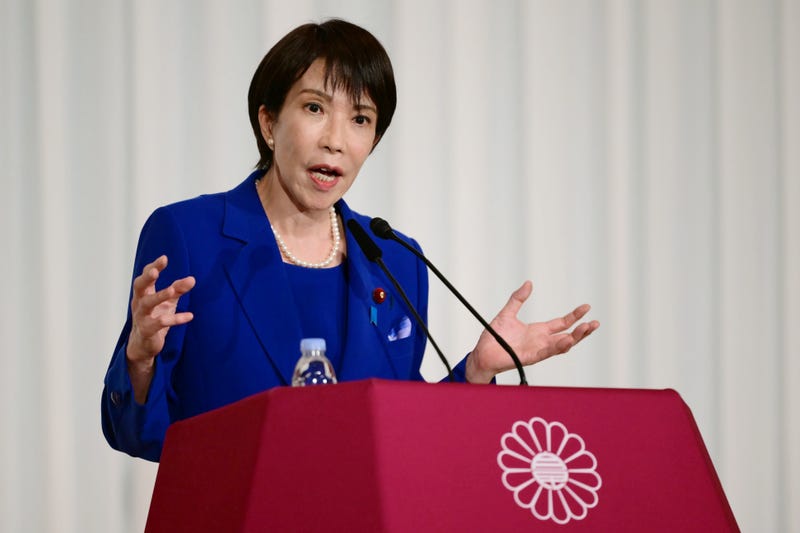
TOKYO (AP) — Japan’s embattled governing party now has its new leader, former Economic Security Minister Sanae Takaichi, a hard-line conservative who is poised to become the country’s first female prime minister.
Takaichi, 64, immediately needs to seek ways to get her long-ruling Liberal Democratic Party to stay in power and regain public support by delivering measures to address inflation and diplomatic challenges such as U.S. President Donald Trump.
A staunch supporter of former Prime Minister Shinzo Abe ’s conservative vision, Takaichi is on the verge of losing her party’s long-time coalition partner, the Buddhist-backed dovish centrist Komeito, because of her ultra-conservative politics. Those include a revisionism of wartime history and regular visits to the Yasukuni Shrine, seen as a symbol of militarism.
She faces the dilemma of sticking to her ideology and losing the coalition partner or shifting to the center, which would lose her fans of her hawkish politics.
Parliamentary vote in mid-October, rising prices and Trump
The LDP and opposition parties are currently considering convening the parliament in mid-October to formally elect a new prime minister.
Takaichi is likely to be Japan’s leader because the LDP, even without a majority in either house of parliament following consecutive election losses, is still by far the largest in the lower house, which decides the national leader, and because opposition groups are highly splintered.
She will need to address rising prices to restore support for the struggling party.
She also faces another big test when she hosts a possible summit later this month with Trump as his trip to Asia to attend international conferences is planned.
In her first press conference Saturday as LDP leader, Takaichi vowed to ensure strengthening of the Japan-U.S. alliance as essential to her country’s diplomacy and security, while also seeking to expand trilateral partnerships including South Korea, Australia and the Philippines.
Takaichi said she will honor the tariffs and investment agreements between the government of the current prime minister, Shigeru Ishiba and the Trump administration.
Cooperation with opposition parties is vital but risky
One of Takaichi’s most urgent tasks is to secure cooperation from the opposition. The LDP seeks to expand its current coalition with the moderate centrist Komeito to include at least one of the key opposition parties, which are center-right.
But instead of finding a third partner, Takaichi is on the verge of losing Komeito, which is critical of her regular visits to the Yasukuni Shrine and her recent emphasis on stricter measures against the growing foreign population in Japan.
In a rare move that shakes their 26-year-partnership, Komeito leader Tetsuo Saito told Takaichi on Saturday that his party has “big worry and concern" about her positions and would not stay in the coalition unless these positions are dropped.
Top party jobs, kingmaker’s influence and reward for those who voted for her
As new party president, Takaichi’s first job is to decide a lineup of top LDP party posts, which she is expected to announce Tuesday.
Takaichi has turned to the LDP’s most powerful kingmaker and former prime minister Taro Aso, a conservative who backed her and reportedly influenced Saturday’s party vote. She is expected to appoint him as deputy prime minister and name his brother-in-law and former Finance Minister Shunichi Suzuki as party secretary general.
Aso on Monday met with a senior official of the key opposition Democratic Party for the People about possible cooperation. Another opposition party, Japan Innovation Party, or Ishin no Kai, had been open to a coalition under Agriculture Minister Shinjiro Koizumi, who lost to Takaichi in Saturday's runoff vote, but that is now up in the air.
Political watchers say Takaichi is considering appointing those who voted for her in the runoff as a reward. Among them is Toshimitsu Motegi, who is close to Aso and has served in key ministerial posts including as foreign and trade ministers. He is being considered for the position of top diplomat.
Takaichi has also suggested appointing a number of former Abe faction lawmakers implicated in slush funds and other scandals to senior posts, despite public criticism over the party's lack of reform measures and subsequent election losses.
Yoshihiko Noda, head of the largest opposition, centrist Constitutional Democratic Party of Japan, criticized the idea, calling it “totally unthinkable."